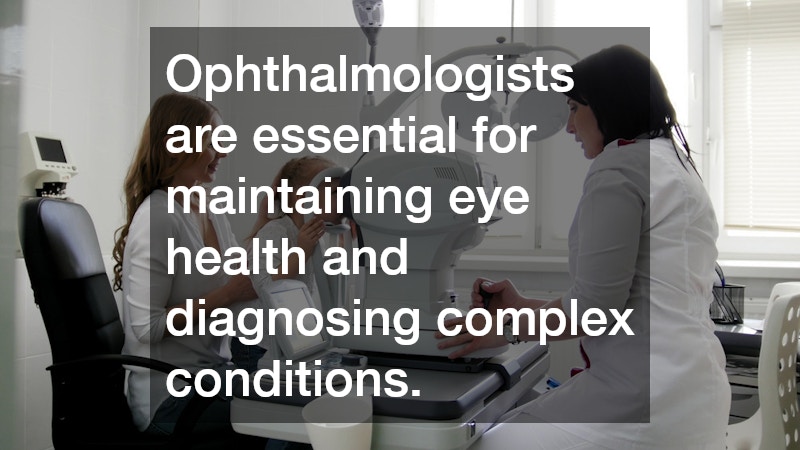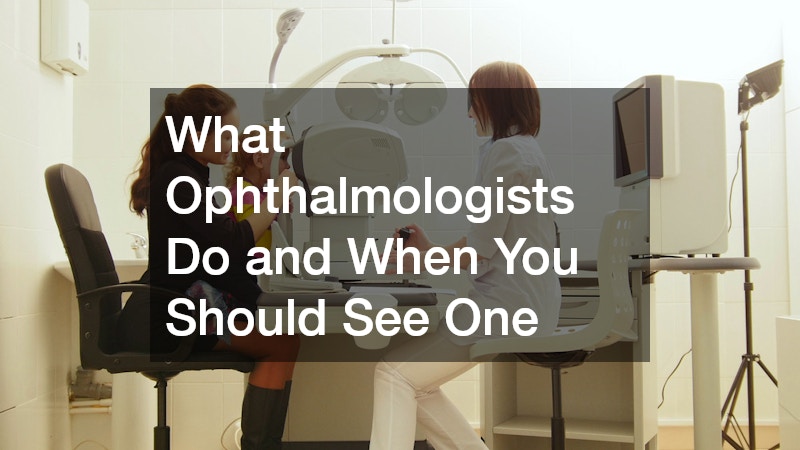Ophthalmologists are medical doctors who specialise in eye care, including the diagnosis, treatment and prevention of eye diseases and vision problems. Unlike optometrists, who primarily focus on vision testing and prescribing glasses, ophthalmologists can perform surgical procedures and manage complex eye conditions. They play a critical role in protecting eye health and preserving sight throughout your life.
Knowing what ophthalmologists do and when to seek their expertise is essential for maintaining good vision and catching issues before they become serious.
The Role of an Ophthalmologist
Ophthalmologists are trained to provide comprehensive eye care. Their services range from routine eye exams and vision correction to diagnosing diseases like glaucoma, macular degeneration and diabetic retinopathy. They also treat infections, injuries and perform surgeries such as cataract removal or laser correction.
Many ophthalmologists undertake additional training in specific areas like paediatrics, retina conditions or corneal diseases. This allows them to manage a wide range of cases and offer tailored care based on each patient’s needs.
Their medical background also enables them to recognise how general health issues, such as diabetes or high blood pressure, affect eye health. They often work closely with GPs and other specialists to manage chronic conditions that impact vision.
When to See an Ophthalmologist
You do not always need a referral to visit an ophthalmologist, but in some cases, a GP or optometrist may recommend it based on your symptoms or medical history. You should consider seeing an ophthalmologist if you experience sudden changes in vision, persistent eye pain or discomfort, flashes of light or floaters or if you have a family history of serious eye disease.
People over 40 should have regular eye exams, as age-related conditions like cataracts and glaucoma become more common. Those living with chronic illnesses such as diabetes or autoimmune diseases should also have their eyes checked regularly, as these conditions often affect vision and eye function.
Children may be referred to ophthalmologists for conditions like lazy eye or crossed eyes, especially if these issues are not improving with standard optometric care.
Common Eye Conditions Managed by Ophthalmologists
Ophthalmologists diagnose and treat a variety of eye diseases. Cataracts, a clouding of the eye’s lens that leads to blurry vision, are one of the most common issues they address. Surgery to remove cataracts is among the most frequently performed procedures in Australia and has a high success rate.
Glaucoma, caused by increased pressure in the eye that damages the optic nerve, can lead to vision loss if left untreated. Early detection and ongoing management by an ophthalmologist can help prevent serious complications.
Macular degeneration is another common condition, especially in older adults. It affects the central part of the retina and can impair the ability to read, drive or recognise faces. While it is not curable, ophthalmologists can offer treatments to slow its progression.
They also manage retinal tears, eye infections, dry eye syndrome and complications from previous surgeries or trauma. In some cases, treatment may involve injections, laser therapy or long-term medication.
How Ophthalmologists Differ from Other Eye Care Professionals
Understanding the difference between ophthalmologists, optometrists and opticians can help you choose the right care for your needs. Optometrists perform eye exams and prescribe corrective lenses. They can detect signs of disease and may refer you to an ophthalmologist for specialised treatment.
Ophthalmologists are the only eye care professionals who are medically trained and licensed to perform eye surgery. Their broader scope of practice means they can handle complex or urgent cases that go beyond the scope of routine vision care.
Preparing for Your Appointment
When visiting an ophthalmologist, you may undergo several tests depending on your symptoms and history. These may include a visual acuity test, dilated eye exam or imaging scans to examine the retina and optic nerve. Your ophthalmologist may also ask questions about your medical background, lifestyle and any family history of eye disease.
It is helpful to bring a list of your current medications, a referral if required and any past eye care records. If you wear glasses or contact lenses, bring them with you as well.
If your eyes are dilated during the exam, your vision may be blurry for a few hours afterwards. It’s a good idea to arrange transport or avoid driving immediately after the visit.
Long-Term Eye Health
Routine visits to an ophthalmologist help protect your long-term eye health, especially if you are at higher risk due to age, health conditions or family history. Early detection of eye problems often leads to better outcomes and may prevent permanent vision loss.
In Australia, Medicare often covers ophthalmologist consultations when referred by a GP or optometrist. Private health insurance may offer additional benefits depending on your level of cover.
Staying on top of regular checkups, managing existing health issues and reporting any vision changes early can help you maintain good eyesight and quality of life as you age.
Ophthalmologists are essential for maintaining eye health, diagnosing complex conditions and providing both medical and surgical treatments. While optometrists handle most routine vision needs, ophthalmologists step in when advanced care is required.
If you notice any sudden or unusual changes in your vision, have a chronic condition like diabetes or are over 40, seeing an ophthalmologist is a smart step. With expert care and early intervention, you can preserve your eyesight and enjoy lifelong visual health.

